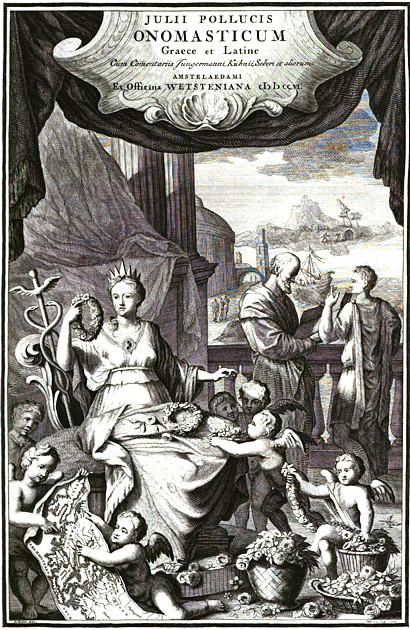Lessico
Giulio Polluce

In greco Ioúlios Polydeúkës, in latino Iulius Pollux.
Retore e lessicografo greco del II secolo dC. Nacque a Naucrati in Egitto![]() , fu
discepolo in Atene del retore Adriano e ricoprì, dopo di lui, la cattedra di
retorica.
, fu
discepolo in Atene del retore Adriano e ricoprì, dopo di lui, la cattedra di
retorica.
Ebbe molti avversari, fra i quali Luciano![]() e Frinico
e Frinico![]() ,
contrari al suo genere di eloquenza. La sua opera maggiore è l'Onomastikón
in dieci libri, un elenco di vocaboli e di sinonimi ordinati per argomento con
esempi e una breve spiegazione del significato, che costituisce (negli
estratti a noi giunti) una preziosa fonte di notizie erudite del mondo
greco-ellenistico.
,
contrari al suo genere di eloquenza. La sua opera maggiore è l'Onomastikón
in dieci libri, un elenco di vocaboli e di sinonimi ordinati per argomento con
esempi e una breve spiegazione del significato, che costituisce (negli
estratti a noi giunti) una preziosa fonte di notizie erudite del mondo
greco-ellenistico.
Julius Pollux
Julius Pollux (Ιούλιος Πολυδεύκης, Ioulios Poludeukes) (2nd century AD) was a Greek or Egyptian grammarian and sophist from Alexandria who taught at Athens, where he was appointed professor of rhetoric at the Academy by the emperor Commodus — on account of his melodious voice, according to Philostratus' Lives of the Sophists. Nothing of his rhetorical works has survived except some of their titles (in the Suda). Pollux was the author of the Onomasticon, a Greek thesaurus or dictionary of Attic synonyms and phrases, arranged not alphabetically but according to subject-matter, in ten books. It supplies in passing much rare and valuable information on many points of classical antiquity— objects in daily life, the theater, politics— and quotes numerous fragments of lost works.
Pollux was probably the person satirized by Lucian as a worthless and ignorant person who gains a reputation as an orator by sheer effrontery, and pilloried in his Lexiphanes, a satire upon the affectation of obscure and obsolete words. A first Latin translation, published at Venice in 1502, made Julius Pollux more available to Renaissance antiquaries and scholars, and anatomists, who adopted obscure Greek words for parts of the body. Julius Pollux was invaluable for William Smith's Dictionary of Greek and Roman Antiquities, 1842.